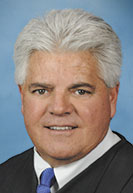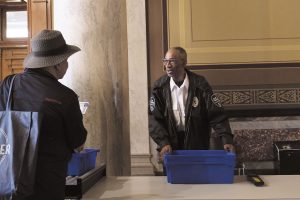Subscriber Benefit
As a subscriber you can listen to articles at work, in the car, or while you work out. Subscribe NowJudges across the country have faced increasing threats to their personal safety in recent years, both in-person and through social media.
Indiana Court of Appeals Chief Judge Robert Altice said he hears from trial court judges that one of their top concerns is dealing with angry people who enter their courtrooms.
“It can be something simple, but people are mad,” Altice said. “And I think that’s kind of frightening.”

Indiana and other states are looking at ways to provide better security for judges, with a Hoosier state committee looking at ways to improve safety and prevent tragedies like those seen in other states.
A New Jersey district court judge lost her only child, Daniel Anderl, in 2020 after a man shot him when he opened the door thinking it was a deliveryman.
The shooter intended to kill the federal judge.
According to the U.S. Courts, the gunman found the judge’s personal information on the internet.
Congress passed the Daniel Anderl Judicial Security and Privacy Act in 2022 to better protect federal judges.
The act is to protect judges’ personally identifiable information from resale by data brokers and also allows them to redact personal information displayed on federal government websites and prevent publication of personal information by other businesses and individuals where there is no legitimate news or other public interest.
But that doesn’t stop the high tensions and potential threats.
U.S. Supreme Court Justice Sonia Sotomayor’s security detail shot an armed man during an attempted carjacking last week, the Associated Press reported.
A spokeswoman for the U.S. Marshals confirmed the deputies were part of the detail protecting Supreme Court justices. The deputies were stationed near Sotomayor’s home.
There was no indication Sotomayor was the target of the attack.
In the Hoosier state
In Indiana, the Court Security Committee met at the beginning of this year, where they discussed protecting judges’ home addresses.
According to the committee’s minutes, former Indiana Supreme Court Justice Brent Dickson and his wife Jan, met with leaders of the Indiana General Assembly to discuss creating a state version of the Daniel Anderl Judicial Security and Privacy Act. Missouri and Oklahoma have passed laws to protect their judges’ personal information.
Indiana’s committee also reported in January that based on a survey of judges in the state, the majority indicated they had received personal threats and some of their family members had as well.
Almost all of the judges who participated in the survey believed that restricting online access to home addresses would make them safer. The committee also discussed firearm familiarization with the Indiana State Police.
It met on July 12 with its new members and chair, Putnam Circuit Court Judge Matthew Headley.
Safety on the bench
Altice noted that there are several things that could be affecting people’s moods, whether it be not agreeing with a ruling or not understanding the legal process.
“I think they’re willing to go to other extremes,” Altice said.
Altice said tensions inside the courtroom can rise, especially in cases involving children.
He noted how federal judges have seen threats in action.
“We fortunately have not experienced that in Indiana,” Altice said. “But it doesn’t mean it can’t happen tomorrow.”
A few years ago, just before the COVID-19 global pandemic, the state’s appellate court lost its security detail. At the time, the Indiana State Police didn’t have the manpower to cover the court anymore.
“We were low-hanging fruit. And so we kept asking them to get somebody up here,” Altice said.
Eventually, the governor’s office offered to provide the court with security.
“Because of the governor’s generosity and his budget, we were able to hire a deputy sheriff for the court which has been awesome and makes us feel a little bit more comfortable,” Altice said.
The Indiana Court of Appeals has its award-winning traveling oral arguments, but a lot of planning goes into those hearings behind the scenes, including how to manage security.
Altice said that, sometimes, they are hearing cases in which the people have already served their sentence and come to the oral argument.
“You don’t know how those people are going to react,” Altice said.
He added that there are some county courthouses in the state that have zero security.
“That’s an explosion waiting to happen,” Altice said.
He explained that when he was a Marion County judge the bar association did a pilot project where it put metal detectors in the City-County Building. Altice said the mayor at the time didn’t like it, so when the pilot project finished the metal detectors went away.
A week later, the attacks of Sept. 11, 2001, happened and the metal detectors returned for good.

Altice described how before the metal detectors were put in, he would be in a courtroom filled with people waiting for the jury verdict not knowing how many people in there were potentially carrying a weapon.
“It had the potential to be chaotic,” Altice said. “I was always very nervous about that.”
He said when he was a trial court judge they usually just had a police officer and a sheriff’s deputy in the courtroom.
There were always arguments in the courtroom and outside in the hallway there would be fights.
“It was scary,” Altice said.
He described having to ride the elevator up in the mornings with the prisoners he would be presiding over later that day.
“I often said it’s going to take somebody to get killed in this building before we get the security that we need,” Altice said. “Fortunately, that never happened.”
Altice said his main concern is with courts in the rural areas of the state, because they don’t have the same type of security that the state courts have.
“It’s a matter of time before somebody explodes something bad,” Altice said. “I think everybody realizes that, which is why there’s the push to increase security.”•
Please enable JavaScript to view this content.
